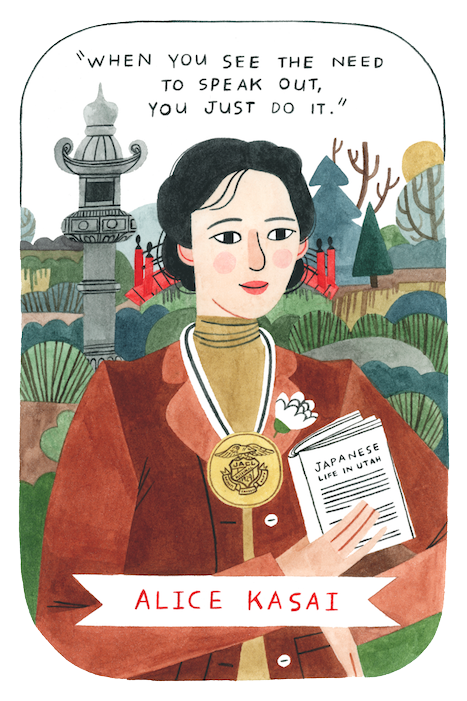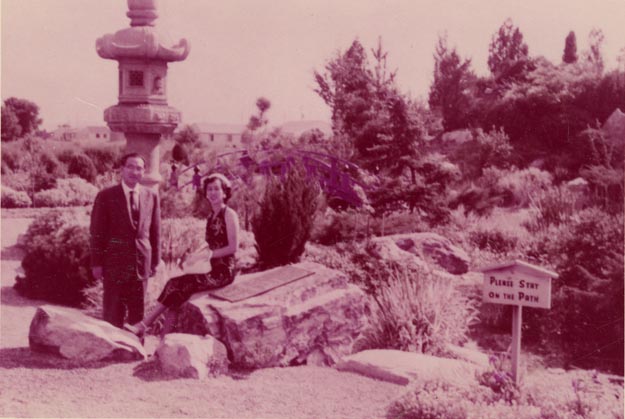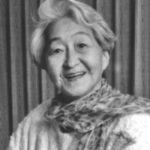
Alice Kasai,
Believer in the Oneness of Humankind
1916-2007
“When you see the need to speak out, you just do it.”[1]
By Rebekah Clark
Historical Director, Better Days
As a civil rights leader in Utah, Alice Kasai devoted her life to empowering, mentoring, and advocating for the rights of Japanese Americans and other disfranchised groups. Despite experiencing firsthand the injustices of racial bigotry, she remained patriotic, optimistic, and relentless in her lifelong activism on behalf of Japanese Americans as well as minority and women’s rights on a broader scale.
Alice was born in Seattle, Washington on September 17, 1916, to Eiji Iwamoto and Suga Fukusho. Conditions in America were difficult for Japanese immigrants, so her mother brought Alice to Japan as a young baby to live with her grandmother for the first six years of her life. When she was brought back to the United States, she joined her family in Utah where they had moved to work in the Latuda mines. Alice graduated from Carbon High School in Price, Utah in 1935 and “did very well” there, becoming the “star of the school.”[2] Two years later, she married Henry Yoshihiko Kasai. They had a family of six children and were the first Japanese Americans to live in the Avenues of Salt Lake City.

Alice and Henry Kasai, 1937. Courtesy of the Kasai family.
During World War II, Alice’s husband Henry was arrested and placed in an internment camp for Japanese community leaders. His two-and-a-half year internment propelled Alice into serving as the first woman president of the Japanese American Citizens League (JACL) in Salt Lake City during his absence. Her home became the league headquarters, and Alice became a powerful advocate for the Japanese community in Utah as she helped coordinate help for families in relocation camps. After the war, she and her husband continued to lobby for citizenship and other civil rights for Japanese immigrants. They helped establish the International Peace Garden in Salt Lake City as well as the Sister City Project between Salt Lake City and Matsumoto, Japan that sponsors student exchange programs and other community projects. Henry died in 1966, and Alice continued her civil rights advocacy while caring for their four youngest children as a single mom.

Alice and Henry Kasai at the International Peace Gardens, circa 1946-1950.Courtesy of Alice Kasai papers, Special Collections, University of Utah Marriott Library.
Alice’s commitment to civil rights and international peace shaped her life as she lobbied for fair housing, employment, education, and other minority rights. In addition to her JACL leadership, she was president of the Utah United Nations from 1985-1988, served on the Oral History Institute Board from 1983-1988, and served on the Council on Aging from 1987-1990. She worked with the PTA for 40 years to increase the focus on educational challenges faced by immigrant and minority children. She worked extensively with the NAACP as well as the Asian Association of Utah, Utah Citizens Committee for Civil Rights, Meals on Wheels, and many other advocacy groups. She was awarded many honors for her life of service, including a medallion in 1983 commemorating over 60 years of JACL service. Recognizing the importance of giving marginalized people a voice, she recorded histories of Japanese Americans in Utah and promoted the Japanese Oral History Project.

Henry and Alice Kasai, 1960. Courtesy of Alice Kasai papers, Special Collections, University of Utah Marriott Library.

Alice Kasai. Courtesy of Kasai family.
As a convert to the Bahá’í religion, which preaches the unity and equality of all people, Alice’s faith provided the foundation for her tireless advocacy and service. She acknowledged that Bahá’í principles were “the strength for everything I have done . . . . working for the unity of all different people and . . . getting away from any type of prejudice.”[3] When Alice Kasai passed away in 2007, her obituary explained: “The intention that drove all her endeavors was her strong belief in the oneness of all humankind.”
Rebekah Clark holds a law degree from J. Reuben Clark Law School and a bachelor’s degree in American History and Literature from Harvard University, where she wrote her honors thesis on Utah’s participation in the national women’s suffrage movement. She’s the Historical Director of Better Days and a member of the Mormon Women’s History Initiative Team.
Check out our short video about Alice here!
Footnotes
[1] Alice Kasai Interview by Sandra Fuller, 65 (October 25, 1984), J. Willard Marriott Library, University of Utah.
[2] Alice Kasai Interview, 53-54 (August 22, 1984).
[3] Alice Kasai Interview (November 1, 1984) 82.

